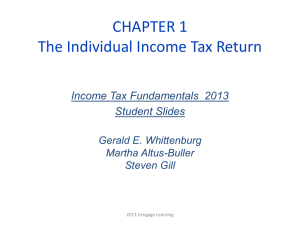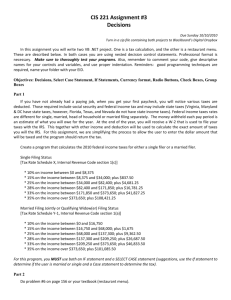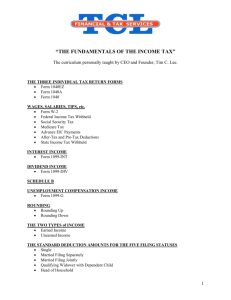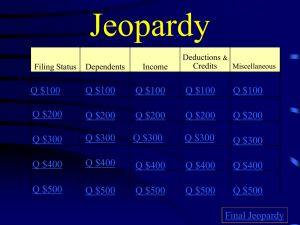CHAPTER 1 The Individual Income Tax Return
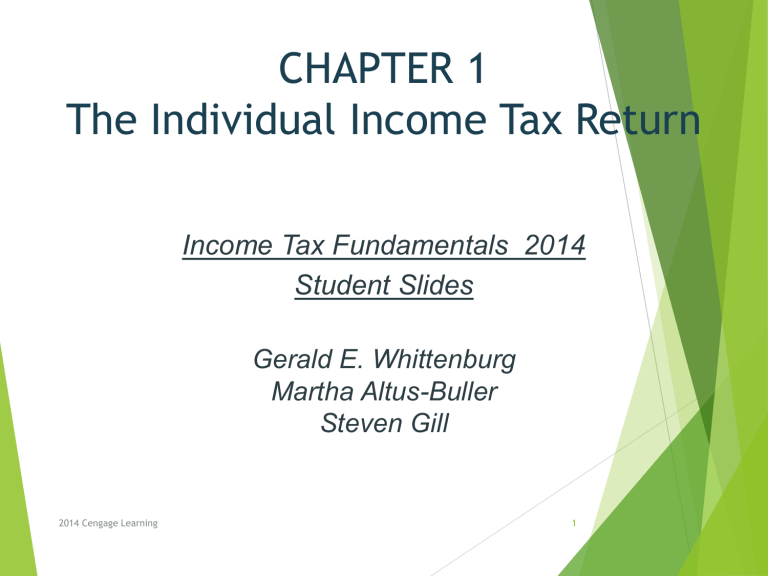
CHAPTER 1
The Individual Income Tax Return
2014 Cengage Learning
Income Tax Fundamentals 2014
Student Slides
Gerald E. Whittenburg
Martha Altus-Buller
Steven Gill
1
History of Taxation
Since 1913, when 16 th amendment was passed, the constitutionality of income tax has never been questioned by federal courts
Income taxes serve a multitude of purposes
2014 Cengage Learning 2
Objectives of Tax Law
Raise revenue
Tool for social and economic policies o o o
Social policy encourages desirable activities and discourages undesirable activities
Deductions for charitable contributions
Credits for higher education expenses
Economic policy as manifested by fiscal policy
Encourage investment in capital assets through depreciation
Credits for investment in solar and wind energy
Both economic and social
Exclude gain on sale of personal residence up to $250,000 ($500,000 if married)
2014 Cengage Learning 3
Primary Entities/Forms
Individual o
Taxable income includes wages, salary, selfemployment earnings, rent, interest and dividends o
An individual may file simplest tax form qualified for
1040EZ
1040A
1040 o
If error made on one of the three above forms, can amend with a 1040X
2014 Cengage Learning 4
Tax Formula for Individuals
This formula follows Form 1040
Gross Income less: Deductions for Adjusted Gross Income (AGI)
AGI less: Greater of Itemized or Standard Deduction less: Exemption(s)
Taxable Income times: Tax Rate (using tax tables or rate schedules)
Gross Tax Liability less: Tax Credits and Prepayments
Tax Due or Refund
2014 Cengage Learning 5
Standard Deduction & Exemptions
2013 standard deduction
Single
Married Filing Joint (MFJ)
Qualifying Widow(er) also known as Surviving Spouse
Head of Household (HOH)
Married Filing Separate (MFS)
$ 6,100
12,200
12,200
8,950
6,100
*Plus additional amounts for blindness or over 65: $1,200 if MFJ,
MFS or qualifying widow(er) and $1,500 if HOH or Single
Exemption = $3,900/person
2014 Cengage Learning 6
Who Must File
Based on filing status and gross income
◦ Generally, if exemptions plus greater of standard or itemized deductions exceed income, then filing is not necessary
◦
•
•
If taxpayer is claimed as a dependent on another taxpayer’s return, dependent’s standard deduction is:
• Greater of $1,000 or
See Figures 1.1
Earned income + $350 and 1.2 on pages
But never more than standard deduction
1-7 and 1-8
2014 Cengage Learning 7
Filing Status
Single
◦ Unmarried or legally separated as of 12/31
◦ And not qualified as married filing separately, head of household or qualifying widow(er)
Married Filing Jointly (MFJ)
◦ If married on 12/31
– even if didn’t live together entire year
◦ Based on a 2013 Supreme Court ruling that struck down a portion of the Defense of Marriage Act (DOMA), same-sex couples may now file jointly
◦ If spouse dies during year, you can file MFJ in current year
Married Filing Separately (MFS)
◦ Each file separate returns
◦ Must compute taxes the same way - both itemize or both use standard
◦ If living in community property state, must follow state law
2014 Cengage Learning 8
Filing Status
Head of Household (HOH)
◦ Tables have lower rates than single or MFS
◦ Taxpayer can file as HOH if:
Unmarried or abandoned as of 12/31
Paid > 50% of cost of keeping up home that was principal residence of dependent child or other qualifying dependent relative
There is one exception to principal residence requirement. If dependent is taxpayer’s parent, he/she doesn’t have to live with taxpayer.
Note: A divorced parent who meets above rules and has signed
IRS/legal document, may still claim HOH even if dependency exemption shifted to ex-spouse
2014 Cengage Learning 9
Tax Computation
Seven brackets
o
10%, 15%, 25%, 28%, 33%, 35%, 39.6% o
Tax rate schedules for different filing types
Qualifying dividends and net long-term capital gains may be taxed at lower rates
o
Rates based on ordinary tax bracket
2014 Cengage Learning 10
